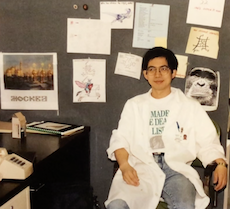Episode Description
Nanoscience is the study of the small — the really small. Consider this; a nanoparticle can be as small as one-billionth of a metre. Nanotechnology in medicine is having a moment, with the profile and perception of the approach raised since it played a role in the development of mRNA COVID-19 vaccines. But for Dr. Gang Zheng, the science of the very small and how it can be harnessed in cancer care has been a pursuit of passion for years.
In this episode, Dr. Zheng talks us through his development of a unique nontoxic nanoparticle, a porphysome, made by combining lipid or fat particles with a compound derived from pacific algae. This so-called Swiss army knife of nanoparticles has the potential to significantly improve the way cancers are detected and treated, from targeted drug delivery to ablation of the tumour from within using light.
Dr. Zheng also discusses the importance of collegiality and collaboration in science and the pride he takes in mentoring and training the next-gen of doers and thinkers, who in turn have dubbed themselves 'Gangsters' in his honour, and how he remains driven by one goal above all others – to make a positive impact on cancer patients.
About Dr. Gang Zheng

Dr. Gang Zheng is a Senior Scientist and the Associate Research Director at the Princess Margaret Cancer Center at UHN. He is also a Tier 1 Canada Research Chair in Cancer Nanomedicine and a Professor of Medical Biophysics, Biomedical Engineering, Pharmaceutical Sciences and Medical Science at the University of Toronto. He obtained his BSc in Chemistry from the Hangzhou University (now Zhejiang University), MSc in Organic Chemistry from Hampton University, and Ph.D. in Medicinal Chemistry from the State University of New York at Buffalo, followed by postdoctoral training in photodynamic therapy at the Roswell Park Cancer Institute. He moved to Canada in 2006. Dr. Zheng's research program focuses on cancer nanomedicine, molecular imaging and photodynamic therapy, with an emphasis on developing clinically translatable technologies to combat cancer.
Want to learn more about Dr. Zhang and his work?
Produced By: Maria Madden |
Host: Christian Cote |
Audio Editing and Mixing: 217 Audio
